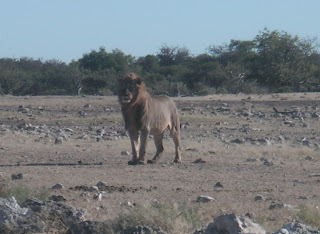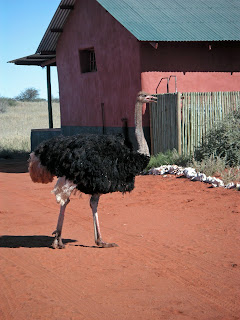Here I am in deepest darkest Africa. So far my wildlife experience is limited to dodging around some guinea fowl on the road to work in the morning, and watching small skinks and lizards flit around the container that is my consulting room. I was somewhat startled by a very large gecko in my kitchen one evening, but he was quite welcome due to the fact that I also have trails of ants wandering around the kitchen and I was quite hoping that the gecko would gorge himself continuously and not chirrup too loudly in the middle of the night. However, he only made one appearance and has since taken himself back outside, presumably to feast on larger and more nutritious fare.

I have been lucky enough to travel through other parts of Africa where wildlife has been more forthcoming. Half-way up Mount Kenya our Land Rover, the Nimble Fairy, got thoroughly bogged in squelching ruts of mud and we were forced to pitch up for the night. The next morning I rolled out of the back of the Nimble Fairy and went to take my morning ... um ... ablutions in the thick grass on the side of the road. As I was ...um ... abluting I glanced to my left and saw a very large pile of elephant dung not 2m from me. Steaming, fresh, recently deposited elephant dung; the perpertrator must have passed our bogged Land Rover not minutes before without making a sound.
As we continued on our way south through East Africa we traversed sun blistered savannahs dotted with flat-top acacia trees, with the sun burnishing the sky in ochre hues and Mt Kilamanjaro, snow-capped and cloud wreathed, in the distance. Cruising as fast as the Fairy would take us, a zebra ran across our path. That's what is called a zebra crossing in Africa.

In Victoria Falls town, I had heard rumours, there was an elephant that visited the camping ground. Various persons tried to dissuade me from believing this tale, but I had hope it would be true. Over a BBQ, with a glass of wine and a plate of salad I heard a "craaaaaaack" noise and looked over my shoulder to see a huge bull elephant stepping OVER the 7-foot security fence. He meandered over to where we sat, waving his trunk in the direction of my salad, then wandered off to knock over a couple of rubbish bins and terrorise the bar.

The next morning I was sitting out with a cup of coffee as the people in the tent next to ours got up. The man headed off to the ablution block, the woman went back into their tent to bring out the breakfast. She came out with plates and cutlery, went back into the tent, came back out with bread and jam, went back into the tent, came out with a box of cereal and milk and went back into the tent. At that moment, the 3 baboons sitting on the fence gave the predetermined signal, dropped to the ground, moved over the table at lightening speed grabbing all the breakfast and sat up on the opposite fence, grinning, tearing the bread between them and passing round the box of cereal. I couldn't stop myself from laughing out loud and as the woman emerged from her tent with the orange juice to find a bare table she glared at me as though I had stolen her breakfast. It was as much as I could do to hold my sides and point at the feasting baboons.

Arriving in Lusaka, Zambia, after a 12 hour drive, the last vestiges of energy were spent putting up the tent and I then gathered my toilet bag and towel and headed off for a shower. At the door to the women's bathroom I found myself obstructed. Bleary eyed and tired I paused, tried to find a way around the obstruction and then decided to be more proactive so I stepped up and smacked the zebra on the butt and told it to get out of my way.

In Namibia we stayed in Etosha National Park in a self-contained cabin, complete with BBQ. We found meat, potatoes and salad and got the embers going. As the meat charred the jackals approached the BBQ, and one of us had to be on guard at all times to protect our dinner. Gives a more literal meaning to "keeping the jackals at bay".
 In the meantime, I was trying by phone to resolve the issue of another Pakistani lady who had collapsed when confronted by a dog, who by all accounts was perfectly friendly and was wanting to make her acquaintance, but she, suffering a morbid fear of dogs, felt it fitting to fall faint to the floor suffering some injury which necessitated an MRI scan to fully reassure the patient of the unlikeliness of her imminent death. While at the hospital she became quite hysterical and the nurse with her had rung me to say that she was now unconscious and unresponsive and they were rushing her back to the clinic for me to resuscitate her. It crossed my mind that as she was already at a hospital, perhaps resuscitation would be better undertaken there rather than bringing her back through tortuous, congested one-way streets to me.
In the meantime, I was trying by phone to resolve the issue of another Pakistani lady who had collapsed when confronted by a dog, who by all accounts was perfectly friendly and was wanting to make her acquaintance, but she, suffering a morbid fear of dogs, felt it fitting to fall faint to the floor suffering some injury which necessitated an MRI scan to fully reassure the patient of the unlikeliness of her imminent death. While at the hospital she became quite hysterical and the nurse with her had rung me to say that she was now unconscious and unresponsive and they were rushing her back to the clinic for me to resuscitate her. It crossed my mind that as she was already at a hospital, perhaps resuscitation would be better undertaken there rather than bringing her back through tortuous, congested one-way streets to me.  The father of the little boy with his ring where a ring should not be, at least not at that tender age, was insistent that I should speak to the surgeon in Pakistan who had done the procedure. Cheerily the surgeon informed me by phone, in a lilting, melodic Pakistani accent, that I should just cut it off ... the ring that is, although given that the appendage to which it was firmly stuck was little bigger than a baked bean and the ring was of hard thick plastic I had visions of disaster. Not being one to shirk from my responsibilities, I took the smallest scissors and clamps I could find, carefully positioning clamps between the ring and the shaft while the young boy lay there still as a statue with tears running down his face. I was mid-way though cutting through the ring, swearing soundly to myself through gritted teeth, when my hysterical unconscious patient was brought with great drama back into the emergency room with staff yelling, puffing and sweating and the lady twitching melodramatically. As she was wheeled past me in a flurry I was able to note that she was breathing which was enough sign of life for me to try to concentrate back on the delicate task at hand. "Oh dear me, that is my neighbour" said the father of the boy as he leaned back over to watch what I was doing. I managed to cut through the ring, remove it without Bobbitting the boy and step across to the other bed as my other patient roused from her swoon and starting crying loudly about the fearfulness of dogs.
The father of the little boy with his ring where a ring should not be, at least not at that tender age, was insistent that I should speak to the surgeon in Pakistan who had done the procedure. Cheerily the surgeon informed me by phone, in a lilting, melodic Pakistani accent, that I should just cut it off ... the ring that is, although given that the appendage to which it was firmly stuck was little bigger than a baked bean and the ring was of hard thick plastic I had visions of disaster. Not being one to shirk from my responsibilities, I took the smallest scissors and clamps I could find, carefully positioning clamps between the ring and the shaft while the young boy lay there still as a statue with tears running down his face. I was mid-way though cutting through the ring, swearing soundly to myself through gritted teeth, when my hysterical unconscious patient was brought with great drama back into the emergency room with staff yelling, puffing and sweating and the lady twitching melodramatically. As she was wheeled past me in a flurry I was able to note that she was breathing which was enough sign of life for me to try to concentrate back on the delicate task at hand. "Oh dear me, that is my neighbour" said the father of the boy as he leaned back over to watch what I was doing. I managed to cut through the ring, remove it without Bobbitting the boy and step across to the other bed as my other patient roused from her swoon and starting crying loudly about the fearfulness of dogs.  Just another day in the life of the International Doctor of Mystery. Life in Ghana has been less dramatic. Of the 2 snake-bites we have treated, neither has sustained more than a superficial scratch. The victims of occupational injury have suffered cut fingers. The acute collapses have fainted or have been suffering a severe case of hangover, apart from the one poor gentleman who had suffered a stroke. I examine feverish children, dispense bottles of paracetemol syrup and write prescriptions for malaria prophylaxis or lab requests for malaria tests.
Just another day in the life of the International Doctor of Mystery. Life in Ghana has been less dramatic. Of the 2 snake-bites we have treated, neither has sustained more than a superficial scratch. The victims of occupational injury have suffered cut fingers. The acute collapses have fainted or have been suffering a severe case of hangover, apart from the one poor gentleman who had suffered a stroke. I examine feverish children, dispense bottles of paracetemol syrup and write prescriptions for malaria prophylaxis or lab requests for malaria tests.  It's now the beginning of Harmattan, the time of year that microscopic particles of the Sahara make their way across to the coast and create a thick pall through which the sun barely penetrates. The joys of West Africa.
It's now the beginning of Harmattan, the time of year that microscopic particles of the Sahara make their way across to the coast and create a thick pall through which the sun barely penetrates. The joys of West Africa. 

























































